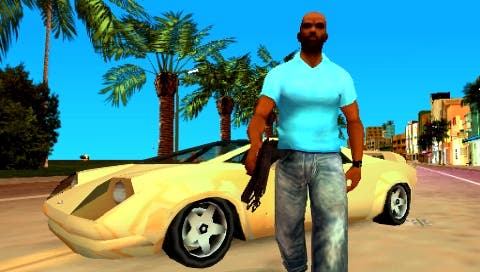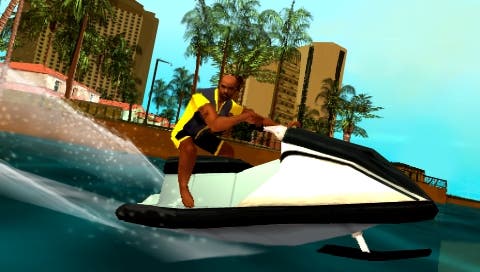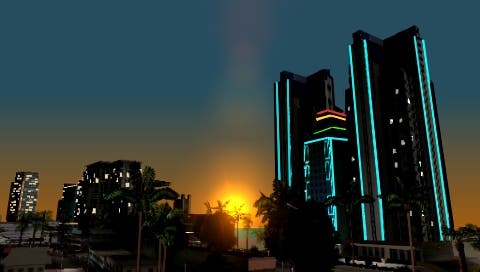Grand Theft Auto: Vice City Stories
Heard that one already?
Few games can claim as much trickle-down impact as Grand Theft Auto. A cult game at a time when gamers themselves were a cult, the PC original spawned numerous spin-offs, expansions and clones, and has given birth to enormous, perhaps even deciding influence in two separate console generations. It's also responsible for me! I didn't decide to be a games journalist; I decided to make a Grand Theft Auto fansite. It was the interminable wait for the second PC game that drove me to write about other stuff. DMA Design has a lot to answer for.
Obviously then GTA is a very important game for PSP. The DS may have a bigger share (and the public heart) of the handheld market, but GTA is something it simply cannot do. Vice City Stories underscores this. The entire city is here, the draw distance is miles better than Liberty City Stories', the frame rate rarely drops into dangerous territory, and Rockstar Leeds' greater exposure to the hardware has given birth to greater feats: realistic water physics, for one, but most notably helicopters. You can now swoop over the city taking in huge vistas, land on rooftops and enjoy almost as much freedom as any "proper" GTA game has ever offered. Very few companies have found as much blood in the stones that pockmark the wasteland of PSP development.
For me though, GTA's biggest draw is the driving - the slidey Hollywood handling with which we're all now intimately familiar. There's a unique thrill to cruising down Ocean Drive listening to Marvin Gaye, handbrake-turning into a side street as you make for the next objective. It feels like gaming home. Even if you've grown tired of the usual zero-to-criminal-hero storylines and the fetch-quest nature of the missions, the journey's still the worthier part - and there's lots of journeying to be done, with numerous ramps to launch yourself from and secrets to uncover. As you go, there's the range of radio stations to enjoy - the talk radio bit, presumably written by that Lazlow chap again, still the highlight. It starts repeating eventually, but takes longer than you'd imagine, despite the UMD format's limits. What's more, even though the original Vice City used up a lot of the real '80s classics, the rest of the radio channels manage to hold their own with licensed content. Aptly, Rockstar still knows its music.

Like its PSP predecessor, Vice City Stories also expands on the GTA formula with multiplayer modes. I've not been able to test them since I was sent the UMD, but I did pop around to Rockstar last month to play for a couple of hours in a group of six, and I had lots of fun with that. Fighting over helicopters with rocket launchers, chasing down drug bundles in fast cars, protecting a bomb at an enemy base long enough for it to blow up, escorting a VIP player around to collect things. The team-based ones are the best, and although some of them draw attention to the PSP's lack of a second analogue nub or stick, they are still worth investigating if your social set ever allows.
It's proper GTA then. Even more proper than Liberty City Stories - and we were surprised how proper that was, remember.
But with that said, Vice City Stories is also probably the weakest game in the series. We can put up with the PSP's quirks - the slightly-too-difficult drive-by shootings, where you have to hold L and use the analogue nub to look left or right, and then fire, unable to steer while you're doing any of this. We can even live with some of the series' latent awkwardness - the gun combat, with its lock-on system that has the habit of targeting innocent civilians when you have a specific target in mind. But where GTA used to be over-the-top-funny, this time it's just a bit over the top, the humour dulled. The characters are all 'insert stereotype, turn up volume'. Here's a redneck who beats his wife. Here's a South American chap who says 'balls' a lot. Here are some jokes about STDs, here's some gender confusion, here's some paranoia and some coke-snorting and some more boring tastelessness. Vic Vance, brother of Vice City's Lance, is hard to take seriously as the player-character - constantly bemoaning the world of cartoon drugs and murder he's voluntarily descended into, all the while you're more interested in ruling it. The mafioso thing worked better for GTA really.

Indeed, where Vice City Stories' content deviates from its predecessors, it's rarely more than adequate - the introduction of the playful jetski probably the most noteworthy exception. It can't turn up soon enough (and sadly doesn't). Meanwhile, the decision to vary mission content so that you'll hop from bike to chopper to shootout to car chase to so on and to so forth certainly makes up for the waiflike offerings in Liberty City Stories, but it does mean that death in one of the latter sections is doubly or triply frustrating. A lot of missions are still resolved through trial and error or simple luck. There are some sensible changes - the ability to swim like you can in San Andreas, and pull yourself out of the water onto jetties; the option to buy back weapons when you're killed or arrested; being told, when you hop into a car, whether it's one that you've yet to deliver to the men at the docks; having money you're owed by properties you've taken over delivered to you without having to go and get it. But some of GTA's clones have moved past it in other respects. Driver: Parallel Lines, for all its flaws and lack of heart, simply let you restart missions at the touch of a button; GTA's taxi-back-to-the-starting-point feels like a step backwards, particularly as you can buy your weapons back anyway. Isn't that just the same thing, obfuscated for no particular reason?
Elsewhere, the new empire-building stuff aims to add depth to the range of side missions, but really it just adds breadth. You can still be a taxi driver, a vigilante or a have-a-go fireman, but now you can also be a pimp, a repo man, a drug dealer, a smuggler, and so on. First you find a business icon on the mini-map, then you blow up the car or bike parked out front, then you kill a wave of enemies and clean out the interior. Hurrah - it's yours. You receive a stipend from it every day, and get called back every so often to fend off another wave of enemies. Go inside and you can start the missions, which usually involve driving around doing pick-ups, deliveries and murders. Alright, but not exactly new ideas.

In the context of the entire series, a lot of Vice City Stories feels old too. Landing in Rockstar's '80s for the second time, I'm finding it a lot harder to have fun with the toys in my sandbox. Missions are fetch quests disguised as driving and shooting, with cut-scenes full of shouting and swearing. Side missions are incredibly repetitive - the 30 rampages just variations on reaching a certain kill-count within a time limit. A lot of the cars and bikes are contemptibly familiar. And where once ramps beckoned me like sirens, now they just look like hookers leaning up against the peeling wallpaper. There are only so many times you can do things like running up a five-star wanted level and using a stolen tank to blast your way around town before the thrill starts to wane, and anybody picking up Vice City Stories after tours of Liberty (perhaps twice), Vice itself and San Andreas will probably feel as I do.
There are some PSP-specific issues too - occasional graphical glitches where textures don't pop into view on cue, or you can see through the road, and the annoying problem of enemies who get too close when you're trying to shoot them. If they do, they can hit you repeatedly with their fists or machete while you're unable to fire, forcing you to run away and turn around (hauling the reluctant camera angle about with the L button) to resume firing, or to fumble for a melee weapon.
As a result, there are two ways to look at Vice City Stories. On the one hand, GTA devotees will probably decide that it's short on inspiration and humour, overly repetitive and ultimately disappointing. When I originally wrote this review, it came down very heavily on this side of the debate. I was going to give it a seven. "A low one. Low enough to do some oral sex. Not funny, but that's what we're up against, and that's the problem." But there are degrees of subjectivity to take into account here, along with the series' position on PSP - as a separate entity, and not just a loveless port. With that in mind, an eight feels like the fairer score - a better reflection of the fact that, while this particular GTA game wouldn't inspire me to sit in my bedroom at night trying to make animated squish graphics to put on the top of my website, it's still happily one of the best games on the PSP, and well worth looking into if you still haven't hit your GTA ceiling.


